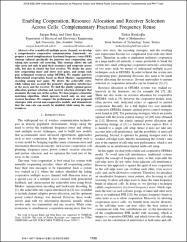Enabling cooperation, resource allocation and receiver selection across cells: complementary fractional frequency reuse
Künye
Bakşi, S., Kaya, O. & Bıyıkoǧlu, T. (2013). Enabling cooperation, resource allocation and receiver selection across cells: Complementary fractional frequency reuse. Paper presented at the 2013 IEEE 24th Annual International Symposium on Personal, Indoor, and Mobile Radio Communications (PIMRC), 1190-1195. doi:10.1109/PIMRC.2013.6666319Özet
For a multi-cell multiple access channel, we develop a comprehensive cooperative communication framework: we propose a novel complementary fractional frequency reuse (FFR) strategy tailored specifically for pairwise user cooperation, also taking into account cell sectoring. This strategy allows the cell edge users not only to pool their resources and cooperate across cells, but also to choose the best receiver. We divide the users into cooperating inner and outer user pairs, and assign each pair orthogonal resources using OFDMA. We employ pairwise bidirectional cooperation based on block Markov superposition encoding among user pairs. We derive the achievable rates, while taking into account the geometry dependent interference at the users and the receiver. We find the jointly optimal power allocation, partner selection and receiver selection strategies that maximize the sum rate of the system. We then propose a heuristic matching algorithm, which operates based only on user and receiver locations. We compare the performance of our proposed strategies with several non-cooperative models, and demonstrate that the sum rate can nearly be doubled, while using the same resources.


















